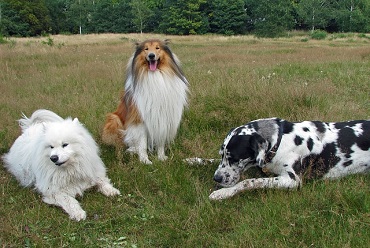
By: Michael L.
Socializing your dog refers to providing him with positive experiences with new things. The best way to make sure your dog has great experiences is to include things he loves (like food or toys). Ideally, this would begin after birth with the breeder of the dogs in a loving environment exposing them to as many new situations, people, and other dogs as possible. The number one recommendation of veterinarians during what is known as the “imprinting” period of a dog’s life is to encourage new puppy parents to partake in parvo disinfected, veterinarian endorsed puppy classes.
The single most important aspect of puppy training is safe early socialization and bite-inhibition, which is most easily accomplished within structured puppy classes.
There is a very small window of time for your puppy to work on socialization.
Between 7 and 16 weeks of age, it is imperative for your puppy to be exposed in a safe environment to all sorts of different puppies and humans so future interactions are fun and not scary. Exposing them to new things like other animals (like cats or horses), new environments (different surfaces, stairs), taking rides in the car, buses, trains, elevator (not escalators), visiting the vet and groomers just for treats and petting, and visiting parks with a lot of activity just to watch the people, animals, and vehicles and giving him treats and love.
Dr. Ian Dunbar, veterinarian and Animal Behavior PhD, a pioneer in puppy training, tells us that safe socialization during the first few weeks at home is of “extreme urgency.” Indeed, Dunbar has launched the Puppy Raising Initiative explaining socialization imperatives for puppies in the short “critical period” of social development—between four and twelve weeks of age. This applies to socialization with people too. “Puppies must be safely socialized to people; otherwise, during adolescence they will likely become wary and fearful and may be aggressive towards people.”
Dr. Lee Harris, a San Diegan veterinarian who studies canine behavior, wisely counsels, “Some common sense needs to be exerted about providing well-chosen socialization.” The American Veterinary Society of Animal Behavior Position Statement on Puppy Socialization advises that socialization in the first three months of life, before puppies are fully vaccinated, should be the standard of care. The organization Operation Socialization: Just Add Puppy offers easy to follow socialization safety guidelines when socializing your puppy.
In general, puppies can start puppy socialization classes as early as 7-8 weeks of age. Puppies should receive a minimum of one set of vaccines at least 7 days prior to the first class and a first deworming. They should be kept up-to-date on vaccines throughout the class.
Please contact us to sign up for our socialization classes. My Dog Teachers are standing by.
